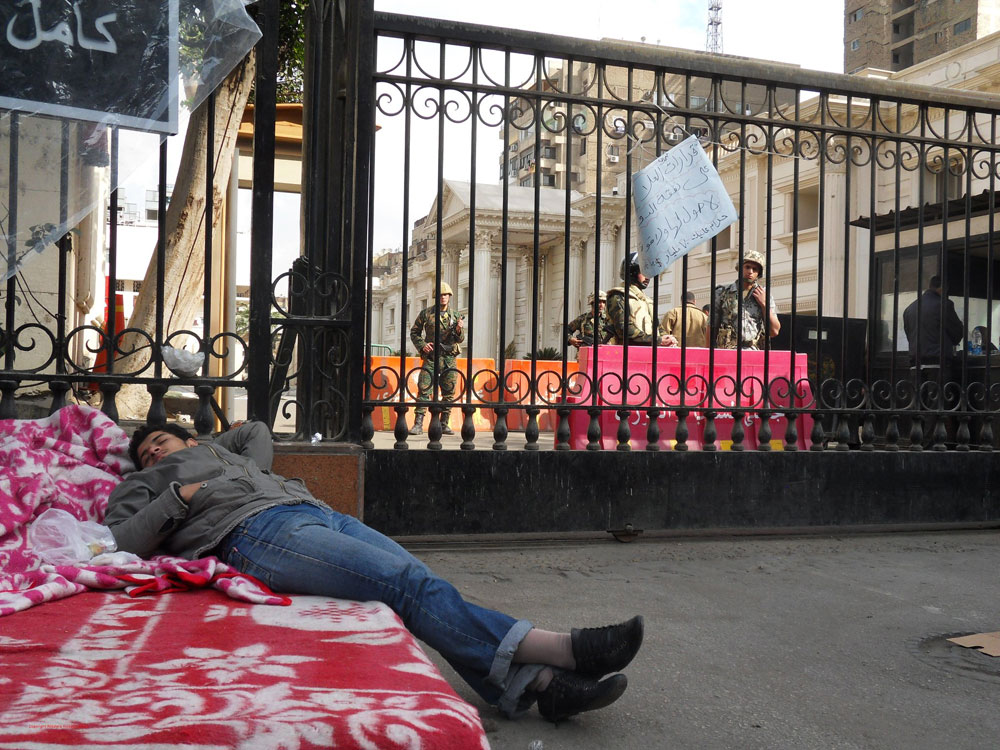
November 6, 2019; LitHub
We think of sleep as neutral; it’s a literal and figurative expression of passivity. But social movements in the US have viewed and used sleep differently, and as such, it plays a major role in the tactics and conversations around how movements and government interact in public.
Franny Nudelman examines this link in her recent book, Fighting Sleep: The War for the Mind and the US Military. Nudelman, a professor of US Culture and History in the English department at Carleton University in Ottawa, explains that sleep has played a major role in some of the most significant movement conflicts of our time.
For example, in 1968, counterculture and anti-war groups came to Chicago to disrupt the Democratic National Convention. Thousands of people surrounded the event, but what sparked the riots was law enforcement’s attempt to enforce an 11pm curfew against protestors who were planning to camp out in city parks.
More poignantly, Nudelman describes Operation Dewey Canyon III, when hundreds of Vietnam Veterans Against the War (VVAW) came to Washington, DC to protest the continuing war in Vietnam. Setting up camp—to cook and sleep and organize daily activity—simulated the routines of an invading army, a parallel of symbolic and practical value for the vets. President Nixon and the federal courts challenged VVAW’s rights to camp out on the National Mall through several appeals.
The final compromise made by VVAW lawyer Ramsay Clark and the Justice Department allowed the veterans to stay on the mall past the 4:30 park closing, but only if they remained awake. They could sing, dance, or hold meetings, but if they fell asleep, they would be arrested. The vets caucused by state and determined to defy the order and sleep on the mall. Nixon’s Justice Department didn’t have the nerve to arrest hundreds of indigent veterans, so on the mall they stayed.
Sign up for our free newsletters
Subscribe to NPQ's newsletters to have our top stories delivered directly to your inbox.
By signing up, you agree to our privacy policy and terms of use, and to receive messages from NPQ and our partners.
Why does sleep play such an important role in protest space? For one thing, it challenges the popular view of protestors as disruptive, violent, or criminal. Its passive nature forces police to actively disrupt or suppress peaceful public activity, belying the “just keeping the peace” narrative law enforcement prefers to project. It forces audiences to consider that the civic status quo is a choice—one actively enforced and protected by institutions—rather than a default, and choices have consequences.
The American Indian Movement demonstrated this facet of protest when they camped out on Alcatraz for 19 months in 1969. Nudelman writes, “If militarism, racism, and colonialism infiltrated the most routine aspects of daily life—a perspective increasingly embraced by movement activists—it was these habits, they maintained, that must be liberated. Protest camps allowed demonstrators to practice such reinvention and put their efforts on public view.”
The Alcatraz occupation, like the Vietnam veterans’ campout, also put government failure on show for the public. The sight of hundreds of veterans camped out on the National Mall because they couldn’t afford motels forced people to confront how badly they had failed to care for those who had served. Similarly, the Native community on Alcatraz provided a very visible example of the kind of Native communities the US disrupts by its very existence, and how the US has failed to provide sufficient land, resources, and support for those communities.
There’s a vulnerability about sleeping in public that makes people uncomfortable because, like the veterans’ campout, it forces civic actors to confront the people whom they have failed. Think about the many states and cities that have attempted to criminalize homelessness; Las Vegas passed a ban just yesterday. Those bans don’t do anything to help the people sleeping outside; they just push them out of public view, because confronting that vulnerability and need is difficult for the citizens with more civic clout. That cultural impulse that makes us uncomfortable to confront sleeping people isn’t limited to the US; in India, Jasmeen Patheja used the vulnerability of sleep to organize protests for women’s safety in public space.
Nudelman goes on to discuss the rejuvenating properties of sleep and how “the same rampant extraction and governance-for-profit that endanger our drinking water and our food supply also endanger our sleep.” Maybe so, but more pertinently for protest purposes, sleep is unproductive. To forbid sleep in public is to demand that any existence in public is not just living, but working. To tell the Vietnam vets or Chicago protestors they could stay in the park all night, but could not sleep, was to refuse to recognize them as people engaging in protest who also had reasonable human needs.
Like the pattern of staging protests at transportation hubs, the communicative use of sleep continues to be a trend among movements; Extinction Rebellion just staged a sleep-in in London in October. It doesn’t hurt, every so often, to have this very human spectacle to ponder as we fall asleep.—Erin Rubin












